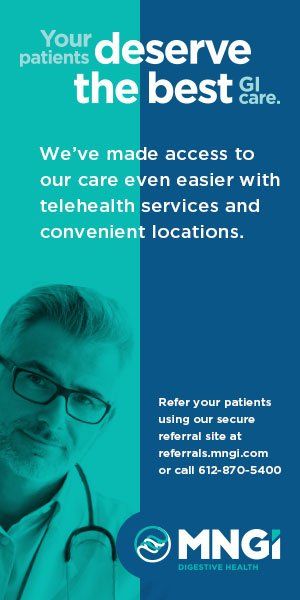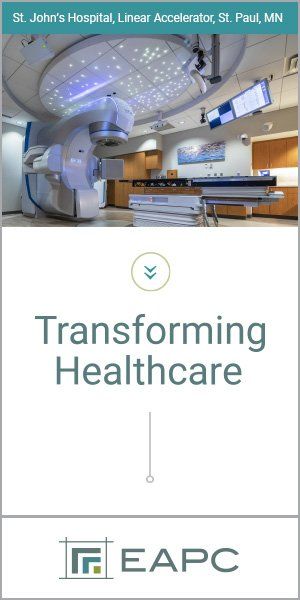Capsules
U of M Medical School Names First Female Department of Medicine Chair
The University of Minnesota Medical School has recently announced Dr. Elizabeth Seaquist as the incoming chair of the Department of Medicine. As a 33-year, tenured faculty member of the U of M Medical School, Dr. Seaquist will lead from the intersection of patient care, research and education. “I am very honored to be asked to serve in this important role. Dr. Igarashi has done an outstanding job of building Medicine during his tenure and I look forward to continuing many of his plans to grow excellence in each of our mission areas,” said Seaquist, who also is an endocrinologist practicing at M Health Fairview. “This department has been my academic home for my entire career and I hope to provide all of our faculty the career development support that I have experienced over the years.” She is an alumna of the University, where she completed both her residency in internal medicine and her fellowship in endocrinology. “As the first woman Chair of Medicine at the University of Minnesota Medical School, I am particularly interested in expanding the diversity of our faculty, students, trainees and staff,” Seaquist said. “I am grateful to Dean Tolar for giving me this wonderful opportunity and am excited to work with the faculty to build our success.” During her tenure at the University, Seaquist has helped to build systems to better link primary and specialty care as associate dean for medical specialties and primary care. She has also been a leader in multiple, groundbreaking interventional clinical trials for the treatment of diabetes, bringing in over 130 research grants, which total over $24 million. Many national institutions have recognized Dr. Seaquist for her leadership, mentorship and unique abilities to care for patients, including the American Association of Physicians, the nation’s oldest medical honor society. “Dr. Seaquist is a superb physician-scientist who is highly respected by her patients and colleagues. She is an experienced and visionary addition to our leadership team, and we are fortunate to have her as the new chair of the Department of Medicine,” said Jakub Tolar, dean of the University’s medical school and vice president of clinical affairs.
Mayo Clinic Launches New Biomanufacturing Venture
Mayo Clinic recently announced a new strategic collaboration in biomanufacturing to deliver novel biotherapeutics for rare and complex conditions. The collaboration brings together science, engineering and manufacturing to advance Mayo Clinic’s vision of delivering new cures to clinical care. The focus will be on therapies derived from human sources known as biologics—cells, blood, enzymes, tissues, genes or genetically engineered cells—for use in medicines. Therapeutics based on biologics have the potential to target exact tissues needing repair. “Mayo is making significant investments in facilities to create the world’s most advanced and innovative ecosystem for the development, manufacture and delivery of biotherapeutics. We are seeking to build a community of innovators to explore ideas, develop new products and create thriving biotherapeutic companies,” said Julie Allickson, Ph.D., the Michael S. and Mary Sue Shannon Family Director of Mayo Clinic’s Center for Regenerative Medicine. “This nexus of entrepreneurs, startups and industry experts will help position Mayo Clinic as an authority in regenerative biotherapeutics.” Dr. Allickson is also the Otto Bremer Trust Director, Biomanufacturing and Product Development, Center for Regenerative Medicine. To support this new venture, Mayo Clinic has formed a strategic collaboration with National Resilience, Inc. to establish Rochester as a center for biomanufacturing regenerative technologies. “Mayo Clinic will advance regenerative technologies from discovery science to early phase clinical trials,” said Gregory Gores, M.D., Kinney Executive Dean of Research at Mayo Clinic. “Research in the emerging field of biotherapeutics lays the foundation to attract the scientific workforce of the future.” The collaboration has these areas of focus:
- Process development expertise to advance Mayo Clinic biotherapeutics.
- Working together to attract biotech companies interested in sponsoring clinical trials at Mayo Clinic for novel regenerative biotherapeutics.
- Providing cell and gene products needed for biomanufacturing early-stage therapeutics.
- Analytical testing and quality control required for manufacturing commercial grade biopharmaceuticals.
Mayo’s goal in developing expertise in biomanufacturing new biologic-based medicines is to accelerate clinical care options that provide new hope for patients.
Sanford Breaks Ground on Virtual Health Center
Sanford Health has recently broken ground on the state-of-the art Sanford Virtual Care Center, a 60,000 square-foot facility that will change the way care is delivered to rural America and serve as a hub for a network of virtual clinics and telehealth services. Construction is underway with an anticipated opening date in 2024. “At Sanford Health, we take great pride in serving America’s heartland. It is part of our legacy and our identity. Today, we take a critical step toward transforming the health care experience across rural America by breaking ground on the Sanford Virtual Care Center,” said Bill Gassen, president and CEO of Sanford Health. The new center will feature dedicated clinician workspaces equipped with the latest telemedicine technology and offer a variety of service lines, including on-demand urgent care, behavioral health care and primary care. The building will also house innovation, education and research initiatives to advance digital health care and workforce solutions for the future. “This flagship center will be the premier training ground to prepare medical students, residents and nurses for the next generation of care delivery,” said Brad Schipper, president of virtual care. “The innovation that takes place in this building will help us deliver on our promise to patients by leveraging the best of technology to provide high-quality, safe care with an emphasis on convenience and affordability.” In addition to the Sanford Virtual Care Center in Sioux Falls, South Dakota, five pilot satellite clinics will be placed where services are otherwise unavailable or diminishing, allowing high-tech, high-touch connectivity with Sanford clinicians. “A large contingency of the 1.5 million patients come to us from rural communities,” Bill Gassen said, defining rural community as a population of 50,000 or fewer. “It makes up a big part of what we do at Sanford Health. It’s part of our mission and at the core of what we do.” With virtual care, Sanford Health hopes to address:
- Sustainability amid rising costs of delivering care.
- Infrastructure limitations, such as challenges with connectivity and broadband internet access in many rural areas.
- Health workforce challenges.
- Health equity and access to care.
Gummies And Chews Now Available For Medical Cannabis Patients
Effective August 1, patients registered in Minnesota’s Medical Cannabis Program became eligible to buy gummies and chews from the state’s medical cannabis dispensaries. Registered patients who are interested in these medical cannabis products can make an appointment for a consultation with a medical cannabis dispensary pharmacist. “The state’s medical cannabis program continues to respond to the needs of patients, and gummies and chews may be useful options for those who may have difficulty swallowing pills or tablets, do not want to smoke medical cannabis, or don’t like the taste of other forms of medicine,” said Minnesota Commissioner of Health Jan Malcolm. These medical cannabis gummies and chews are separate from the recently authorized hemp-derived edible cannabinoid products regulated by the Minnesota Board of Pharmacy. Under the guidelines of the state’s medical cannabis program, consultations are required when a patient changes the type of medical cannabis they receive. Both medical cannabis manufacturers are currently scheduling consultations. Patients should visit their dispensary’s website for details (see Green Goods or RISE dispensaries). The newest options for medical cannabis patients were approved last year during the Minnesota Department of Health’s annual petition and comment process to solicit public input on potential qualifying medical conditions and delivery methods of medicine for the Medical Cannabis Program. To become a patient in the Medical Cannabis Program, a person has to be certified by a participating health care practitioner for at least one of 17 qualifying medical conditions. More information on the enrollment process is available on the Office of Medical Cannabis website. Minnesota’s Medical Cannabis Program added dried flower as an option for patients 21 and older, effective March 1 this year. Enrollment in the program has steadily increased since the program was launched in 2015, according to the Minnesota Medical Cannabis Dashboard.
New MDH Study Shows $8B Impact of Excessive Drinking
Excessive drinking cost Minnesotans nearly $8 billion in 2019, according to a new study from the Minnesota Department of Health (MDH) published recently in the American Journal of Preventive Medicine. The study found the greatest financial cost fell on those who drink excessively and their families, as well as government and health insurance providers. Other parts of society, including employers, were also found to experience negative impacts from excessive drinking. “Excessive drinking can significantly affect individual health, but it also has a cost for families, communities and the health care system,” said Minnesota Commissioner of Health Jan Malcolm. “The financial burden is staggering, and of course there are additional psychological and societal impacts and harms in addition to those measured here. It’s important that we acknowledge these impacts and find ways to mitigate them.” The study shows excessive drinking cost Minnesotans $7.85 billion in 2019, through lost productivity, health care costs and other costs such as those related to criminal justice and motor vehicle crashes. The total financial cost equals $1,383 per Minnesota resident. Excessive drinking includes binge drinking (four or more drinks on an occasion for women, five or more drinks for men), heavy drinking (eight or more drinks per week for women, 15 or more drinks per week for men), or any drinking among pregnant people or people under age 21.
Key findings of the report include:
- Lost productivity accounted for almost three-quarters of the financial costs, including increased absenteeism, impaired productivity at work and at home, premature mortality and incarceration.
- About 3% of inpatient hospital treatments were attributable to alcohol, but these visits accounted for 35% of all inpatient health care costs.
- For each alcoholic drink purchased, people in Minnesota experience an impact cost equivalent
of $2.86. - Binge drinking contributed to 73% of the financial costs to society, or $5.7 billion.
In addition to the economic costs, excessive drinking is linked to an increased risk of violence and injury, like traffic crashes and chronic health problems like liver disease, heart disease, high blood pressure and some cancers.
State-Mandated Telehealth Survey Begins
The 2021 Minnesota Legislature passed the Minnesota Telehealth Act, which among other things, extends existing reimbursement rates for telemedicine patient visits through June 30, 2023. The legislation also required Minnesota Department of Health (MDH) to conduct a study of the impact telehealth has on both the private health insurance industry and Minnesota Health Care Programs, including Medical Assistance and MinnesotaCare. The study is now underway, and will involve Minnesota residents, providers, and payer organizations by inviting them to participate in a survey with Wilder Research. Anyone may see if they are eligible to participate in the survey using this link to register: MDH Telehealth Screening- Providers (voxco.com). Eligible registrants will be contacted by Wilder Research with further details. If you have already provided telehealth care you will be eligible and your participation will help shape future reimbursement policies around these services. The MDH Telehealth Study will evaluate expansion of telehealth services and how this could impact future reimbursement policies. Several factors will be evaluated including access, quality of care, outcomes, patient satisfaction, value-based payments and innovation. It will weigh healthcare disparities and equitable access for underserved communities as well as healthcare costs and premiums. Also surveyed will be the impact on and availability of, in-person care, including specialty care, particularly in rural areas. The study will examine how payers ensure that telehealth services are appropriate to the patient’s needs and that patients may choose whether to seek or receive care via telehealth. It will measure whether audio-only communication supports equitable access to health care services, including behavioral health services, and whether it eliminates barriers to care for vulnerable and underserved populations without reducing the quality of care, worsening health outcomes, or decreasing patient satisfaction. Additionally surveyed is whether populations for which increased access to telehealth improves or negatively impacts health outcomes. The State welcomes all qualified participation in the survey.
MORE STORIES IN THIS ISSUE
cover story one
The Moral Law Within: Care beyond medical services
By JULIA JOSEPH-DI CAPRIO, MD, MPH
cover story two
Care Coordination: Improving patient satisfaction and engagement













